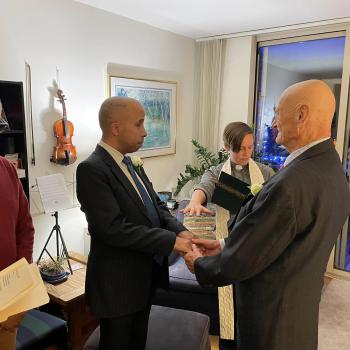That is a difficult message. It can even be frightening. It teaches hard doctrine: if others attack me or threaten me and I fear in response, then I do not have perfect love. The advice implied by such a claim seems foolhardy: do not fear those who threaten you. Aren't there those whom I should legitimately fear, those who can destroy me physically or financially, those who can hurt my family, those who can eat at my soul with pornography and violence?
Mormon doesn't deny that there are such people. He doesn't deny that they can hurt me, nor does he tell me to ignore them or pretend that they are not dangerous. He says something that may be more difficult, that I should not fear them. They threaten, and their threats may move from the threatening realm of possibility to the painful realm of actuality. Nevertheless, I ought not to fear. Ideally, I will not fear even certain pain if I love as God loves!
How can that be anything more than idle and perhaps dangerous thinking, thought that describes an impossible life? Because it has already been done. Jesus has already done what Mormon implicitly advocates. Because he loves them, Jesus did not fear those who threatened him with certain pain and death. Indeed, according to Mormon scripture, Jesus loved them in premortality—probably before they knew that they would threaten him—and he knowingly volunteered to suffer the outcome of their threats. All humanity is figured in those who breathed out cruelty and wrath against him the night before his crucifixion. But Mormon teaches us that Jesus the Messiah, loving in response to the suffering inflicted on him and, so, not fearing, must figure us instead.
If we ought not to fear those who can harm our bodies, how much less can we justify some of our more common fears, like the fear of speaking to those we do not know? Sometimes that fear is expressed as shyness, sometimes as a fear of making telephone calls, sometimes as a fear of speaking in public. Fear of others can show itself in many ways, but if we take Mormon at his word, it is a sign of as yet imperfect love. I would not fear speaking to a member of my family, or calling one of them, or speaking to one. Why not? Because, loving them, I can reach out to them without fear.
Sometimes when I fear another person, it is because I am not sure that I will be loved by them. It is as if I say, "I love them, but I'm not sure they will love me." I look for a return on my love, as if it were an investment. But perfect love is no investment. God does not love us for what it will get him, but for what it will get us: "For behold, this is my work and my glory—to bring to pass the immortality and eternal life of man" (Moses 1:39). As the word "selfless" says, selfless love "does not seek something for itself" (1 Corinthians 13:5), not even a return of proffered love.
John and Mormon teach us that we have no reason to fear God's judgment if we live together in God's love in our wards and other congregations, in the broader community, local and national, and in the world. As individuals, we have no reason to fear others, not even our enemies, if we are filled with the everlasting love of God, figured by our Savior, Jesus Christ. Christians are not guaranteed lives free of pain and difficulty. If we remember that Jesus himself did not escape pain in this world, that should not surprise us. Indeed, we should be ashamed to expect to avoid what he did not. If our lives are figured according to the life he lived, then we too will take on the infirmities and pains of others as well as the pains of our own mortality. But if we are filled with the love of God we can live without fear, for "perfect love casteth out fear."
*Bauer, Danker, Arndt, and Gingrich, A Greek-English Lexicon of the New Testament and Other Early Christian Literature (3rd ed.) s.v. τέλειος, α, ον.





